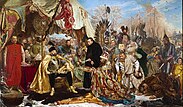The Livonian War was fought between 1558 and 1583 for control of Old Livonia, the territory of present-day Estonia and Latvia. The Tsardom of Russia faced a variable coalition of Denmark–Norway, Sweden and Poland–Lithuania. The years 1558–1578 were a period of Russian dominance in the region, marked by early successes at Dorpat (Tartu) and Narva, and the dissolution of the Livonian Confederation. The Confederation's collapse brought Poland–Lithuania into conflict with Russia. Stephen Báthory, after becoming king of Poland, eventually turned the tide of the war, with successes between 1578 and 1581, including the joint Polish–Swedish offensive at the Battle of Wenden. This was followed by a long campaign through Russia, before a prolonged and difficult siege of Pskov. The war between Poland-Lithuania and Russia was concluded favourably for the former with the Truce of Yam-Zapolsky in 1582, with Russia losing Polotsk and all its holdings in Livonia to Poland–Lithuania. Sweden gained most of Ingria and northern Livonia, while Russia was left in humiliating defeat and became increasingly isolated from western politics and influence. (Full article...)
